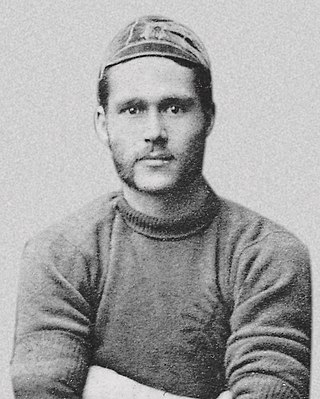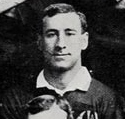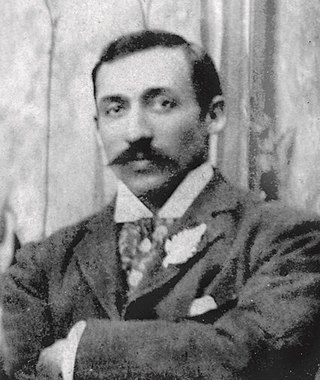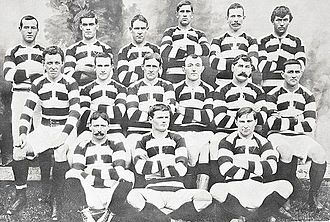
The New Zealand national rugby union team, commonly known as the All Blacks, represents New Zealand in men's international rugby union, which is considered the country's national sport. Famed for their international success, the All Blacks have often been regarded as one of the most successful sports teams in history.

David Gallaher was an Irish-born New Zealand rugby union footballer best remembered as the captain of the "Original All Blacks"—the 1905–06 New Zealand national team, the first representative New Zealand side to tour the British Isles. Under Gallaher's leadership the Originals won 34 out of 35 matches over the course of tour, including legs in France and North America; the New Zealanders scored 976 points and conceded only 59. Before returning home he co-wrote the classic rugby text The Complete Rugby Footballer with his vice-captain Billy Stead. Gallaher retired as a player after the 1905–06 tour and took up coaching and selecting; he was a selector for both Auckland and New Zealand for most of the following decade.

The Whanganui Rugby Football Union (WRFU) is the governing body for rugby union in the Whanganui region of New Zealand. The Whanganui Rugby Football Union was formed in 1888.

Billy Stead, born John William Stead, was a rugby union player born in Invercargill who played for New Zealand, the All Blacks, on their 1905–06 tour. Stead also played provincially for Southland, and later coached various teams, including Southland and the New Zealand Māori. A bootmaker by trade, he also co-authored The Complete Rugby Footballer with Dave Gallaher, and was a columnist for the Southland Times, and New Zealand Truth.

Joseph Astbury Warbrick was a Māori rugby union player who represented New Zealand on their 1884 tour to Australia and later captained the 1888–89 New Zealand Native football team that embarked on a 107-match tour of New Zealand, Australia, and the British Isles.

James Hunter was a rugby union footballer who played for New Zealand's national team, the All Blacks. He played mainly at second five-eighth, although he could play any position in the backline. He played for Hawera Club before being selected for Taranaki in 1898 and the North Island in 1904 before his first All Blacks selection in 1905. He toured with the 1905 All Blacks that travelled to Great Britain, France and North America. After returning he continued to be selected for the All Blacks until retiring after the 1908 season.

David Revell "Darkie" Bedell-Sivright was a Scottish international rugby union forward who captained both Scotland and the British Isles. Born in Edinburgh, and educated at Fettes College where he learned to play rugby, he studied at Cambridge University and earned four Blues playing for them in the Varsity Match. He was first selected for Scotland in 1900 in a match against Wales. After playing in all of Scotland's Home Nations Championship matches in 1901, 1902 and 1903, Bedell-Sivright toured with the British Isles side – now known as the British & Irish Lions – that toured South Africa in 1903. After playing the first 12 matches of the tour, he was injured and so did not play in any of the Test matches against South Africa.
Colin "Col" Windon, was a rugby union player and soldier who captained Australia – the Wallabies – in two Test matches in 1951. By age 18 Windon was playing at flanker for his club Randwick in Sydney's Shute Shield. After serving with the Second Australian Imperial Force in the Pacific Theatre during the Second World War, Windon resumed his rugby career in 1946. He was first selected for Australia for their tour of New Zealand that year. Despite the Wallabies losing both their Tests on tour, Windon impressed with his play.
John Clarence Spencer (1880–1936) was a New Zealand rugby football player who represented New Zealand in both rugby union and rugby league. His brother, George, also was a dual-international.
George Gothard Aitken was a rugby union footballer who represented New Zealand – known as the All Blacks – and then Scotland. He was born in Westport, New Zealand, and was selected to play provincially for Buller at the age of 16. After moving to Wellington, Aitken played for the province from 1917, and from there was selected for the All Blacks side that faced South Africa when they toured New Zealand in 1921. After only two Test matches for the All Blacks, both as captain, he was dropped from the team. In 1922 Aitken was awarded a Rhodes Scholarship and travelled to England to study at the University of Oxford. He played for the university's rugby club, and from there he was selected for Scotland. He first represented the country in 1924, and in 1925 appeared in all of their Five Nations matches; Scotland won all four of those games, and in doing so achieved their first ever Grand Slam.

George Nicholson was a New Zealand rugby union footballer who played for New Zealand – the All Blacks – between 1903 and 1907. He played club rugby in Auckland for the City club, before making his provincial debut for Auckland in 1901. After playing for the North Island in 1902, he was selected for New Zealand's tour of Australia in 1903 where he played in the All Blacks' first ever Test match – against Australia in Sydney. The following year he was selected for New Zealand when they played a one-off Test against the British Isles who were touring New Zealand; New Zealand's first home international. In 1905 and 1906 he was selected for the All Blacks tour of Europe and North America. This was the first New Zealand national team to tour the Northern Hemisphere, and played 20 matches during the trip, but did not appear in any internationals. After returning to New Zealand he switched clubs to Ponsonby in 1907, and that year played two Tests for New Zealand against Australia – his last matches representing his country. After retiring from rugby he was involved in the sport as a referee, selector and administrator. He was one of the last surviving members of the Original All Blacks, as the 1905 team was called, and was present at the 75th jubilee celebrating for the formation of the New Zealand Rugby Football Union in 1967.

George Alfred Tyler was a New Zealand rugby union player who represented New Zealand – the All Blacks – between 1903 and 1906. He played in New Zealand's first seven Test matches, including all five Tests on the pioneering Original All Blacks 1905–06 tour of the British Isles and France. He played club rugby for City in Auckland, and was selected for his province between 1899 and 1911. His brother Bill Tyler also played rugby for City and Auckland before switching codes and representing New Zealand at rugby league.

Henry "Norkey" Dewar was a New Zealand rugby union forward, who played for the All Blacks, and represented Taranaki and Wellington provinces.

Frederick Roberts was a rugby union footballer who played for the New Zealand national team, commonly called the All Blacks. Playing at halfback, he played for the 1905 Original All Blacks, the first New Zealand representative team to tour the British Isles. He was the only halfback taken on the tour, and played in 28 of their 32 matches in the British Isles. New Zealand rugby historian Winston McCarthy wrote of Roberts that he was "a superb passer, a judicious runner from the scrum, and excellent two-foot kicker and a giant on defence." Roberts continued to be selected by the All Blacks until 1910, when he captained the New Zealand team on their tour of Australia.

William Cunningham was a New Zealand rugby union player who represented New Zealand—known as the All Blacks—between 1901 and 1908. Most notably he toured with the Original All Blacks on their 1905–06 tour of the British Isles, France and North America. They were the first New Zealand representative team to visit the British Isles, and of their 32 matches there Cunningham played in 23. He played mainly at lock, and was added to the touring party due to his strong scrummaging ability. He played in three Test matches during the trip: against Scotland, Ireland and France, but did not play in the loss to Wales due to injury, the All Blacks' only defeat on tour.
Alexander McNaughton "Barney" Armit was a New Zealand rugby union player. He represented New Zealand on their 1897 tour of Australia, however he is best remembered for having died from injuries sustained while playing a match in 1899. He represented Otago from 1893 until his death, and played for the South Island in the Inter-Island match of 1897.
William "Mac" McKenzie, also known as "Offside Mac", was a rugby union player who represented New Zealand in the 1890s. Playing at wing-forward, McKenzie was first selected for the New Zealand national team on their 1893 tour of Australia, and continued to be selected up until the end of New Zealand's 1897 tour of Australia. In his 20 matches for the national side, McKenzie scored 23 points.

William Thomas "Tabby" Wynyard was a rugby union footballer who toured with the 1888–89 New Zealand Native football team and the 1893 New Zealand team. He also played first-class cricket for both Wellington and Auckland.
Archibald D'Arcy was a New Zealand rugby union player. D'Arcy was born and raised in Masterton, New Zealand, and first played rugby for the Red Star club before later playing with Masterton. He was first selected for Wairarapa Rugby Football Union, his provincial side, at age 16, and continued to play for them until 1894. As an administrator he represented the Wairarapa Rugby Football Union in 1891 at an inter-provincial meeting where the formation of the New Zealand Rugby Football Union (NZRFU) as first discussed. He was selected, as a fullback, for the first NZRFU-sanctioned New Zealand side, which toured Australia in 1893. Captained by Thomas Ellison, the team played eleven matches, including three against New South Wales, and lost only one. Despite being selected as a fullback, D'Arcy played two matches on the tour in the forwards.
Robert "Rab" McKenzie, was a rugby union player who represented New Zealand twice in 1893. He first played provincial rugby for Auckland in 1888, including three against the touring 1888 British Isles team. He scored Auckland's first ever try against a British Isles side in the first match, and was in the team less than a week later for the second; the second match resulted in a 4–0 loss for the tourists. He continued representing Auckland until 1891, and the following year was living in the Taranaki, for whom he played provincial rugby that season.













